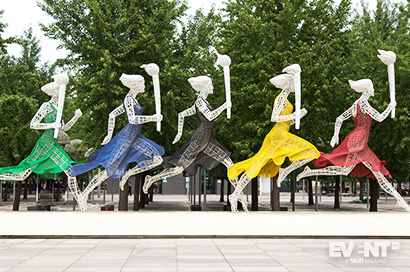Skift Take
In a big move yesterday, the International Olympic Committee (IOC) officially postponed this year's Olympic Games. Here's what happened and what it means for an events industry still struggling to manage the fallout from the coronavirus outbreak.
The fate of the 2020 Summer Olympics, set to take place in Tokyo starting on July 24th, has been a topic of discussion for the past several weeks as the coronavirus has continued to spread throughout the world.
Yesterday, the IOC and Japan’s Prime Minister, Abe Shinzo, officially announced that the Games would be postponed until 2021. In their statement, they claimed that the Games have been postponed “to safeguard the health of the athletes, everybody involved in the Olympic Games and the international community,” referencing WHO Director-General Tedros Adhanom Ghebreyesus’s remarks at the latest press briefing that “the pandemic is accelerating.”
This comes after numerous calls to postpone the games from countries increasingly concerned over public health and athletes’ inability to properly train due to social-distancing restrictions around the globe. Despite the official messaging, the decision clearly wasn’t made out of an overwhelming concern for the safety and wellbeing of all those involved, given how long it took for organizers to finally announce the postponement.
Behind the Decision-Making Delay
The Japanese government and the IOC have been under heavy criticism for moving forward with the event despite mounting complaints and objections. Up until very recently, the IOC still maintained that there were no plans to cancel the Olympics.
Many other sports organizations have already cancelled or postponed their events, including the NBA, which suspended its current season, but the Olympics remained unaffected because they were still several months away.
That all changed on Monday, when both Canada and Australia announced that they would not be sending athletes to Tokyo this summer. Several major countries pulling out of the event was apparently the last straw and seemingly prompted the postponement announcement yesterday.
The Economic Impact of Postponement
The Olympics have a huge economic impact on their host city and country — cities often spend millions preparing and rely on an influx of tourism to boost the local economy and deliver an ROI. Japan has spent $13.4 billion on the 2020 Olympics, including $277 million for the new Olympic Stadium in Tokyo.
The postponement affects every industry directly and indirectly involved in the Olympics, including the insurance and service industries. Businesses like hotels and restaurants that were banking on millions of visitors this year will have to hold out a little longer. The Games’ sponsors will also take a hit, although for the time being, it’s unlikely that any will request their money back or will be pulling out of their sponsorship agreements.
The Outlook for the Industry
In their joint statement, the IOC and the Tokyo 2020 Organizing Committee included as part of their reason for postponing that “the unprecedented and unpredictable spread of the outbreak has seen the situation in the rest of the world deteriorating.” While it’s certainly true that the scale of the outbreak is unprecedented in modern history, its unpredictability is more debatable.
Aside from the organizers, it seems as though every party involved in the Olympic Games has been calling for them to be postponed for weeks, and although it’s impossible to predict the exact extent of the outbreak — since it largely depends on how countries respond — health officials have long been warning that it was going to become more widespread.
There are currently over 400,000 confirmed cases worldwide, with the number rapidly growing. Italy is still reporting hundreds of deaths each day, and with the US now being hit hard, there is no guaranteed end in sight. It was becoming increasingly inevitable that the Olympics would be affected.
The decision to postpone the Olympics calls into question the viability of events planned past the first two quarters of the year. The organizers initially thought they would be safe because the event wouldn’t be taking place until the third quarter, but they proved to be wrong.
It remains unclear how this decision will affect the Games, which will still be referred to as the 2020 Olympics even though they’ll be taking place in 2021. For example, certain older athletes may choose not to compete next year.
In addition, the rescheduling of the Games poses a potential logistical issue for the NBA depending on when they are slated to take place. If the Games are rescheduled for the spring, they could interfere with the regular NBA season and affect which players are sent to Tokyo.
The IOC has stated that this postponement will not affect the next Olympics — they will take place in Paris in 2024 as planned — meaning that there will only be three years between the two events.
IN CONCLUSION
The postponement of the Olympic Games is by far the most significant event-related outcome of the coronavirus situation. The last time the Games were cancelled was in 1944 due to World War II, and never in their history have they been postponed.
This is a major decision that will have ramifications throughout the sports and events industries, and exemplifies how the current pandemic continues to disrupt even the most high-profile and long-standing events.





